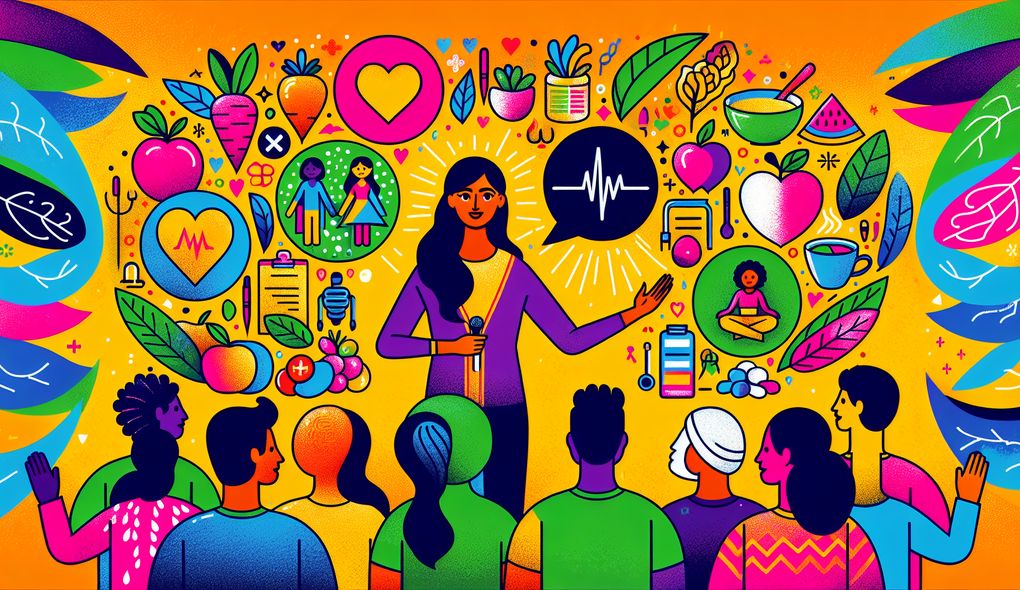Why do you believe cultural competency is important in health education?
JUNIOR LEVEL

Sample answer to the question:
Cultural competency is important in health education because it allows us to understand and address the unique needs and perspectives of different cultural groups. When we have a deep understanding of diverse cultural backgrounds, we can develop effective health education programs that are sensitive to cultural beliefs, practices, and values. This helps us build trust and rapport with the communities we serve, and ensures that our messages are relevant and accessible to everyone. By promoting cultural competency, we can reduce health disparities and improve health outcomes for all individuals, regardless of their cultural background.
Here is a more solid answer:
Cultural competency is crucial in health education as it allows us to effectively communicate and engage with diverse populations. By understanding cultural beliefs, practices, and values, we can tailor health education programs to meet the specific needs and preferences of different cultural groups. For example, when working with Hispanic communities, we can incorporate culturally relevant materials and activities that align with their traditions and language. This not only improves understanding and engagement but also promotes trust and credibility. Moreover, cultural competency helps address health disparities by recognizing the impact of social determinants of health, such as race, ethnicity, and socioeconomic status. It enables us to design interventions that consider these factors and ensure equitable access to health education and resources. Overall, cultural competency is essential for promoting inclusivity, reducing disparities, and improving health outcomes for all individuals.
Why is this a more solid answer?
The solid answer provides a more comprehensive understanding of the importance of cultural competency in health education. It includes specific examples and details to support the reasoning. It addresses the evaluation areas mentioned in the job description, such as cultural understanding and sensitivity, communication skills, ability to work with diverse populations, and knowledge of public health principles and practices. However, it could be improved by further expanding on the benefits and impact of cultural competency in health education.
An example of a exceptional answer:
Cultural competency plays a pivotal role in health education by fostering inclusivity, breaking down barriers, and improving health outcomes for diverse populations. A culturally competent health educator understands the significance of cultural beliefs, practices, and values and integrates them into educational programs. For instance, when working with Asian communities, I conducted research on traditional healing practices, such as acupuncture and herbal medicine, and incorporated them into the curriculum to emphasize holistic approaches to health. This approach not only resonated with the community but also empowered individuals to take charge of their own well-being. Additionally, cultural competency enhances communication skills, allowing educators to effectively deliver health messages using culturally appropriate language, visual aids, and storytelling techniques. By being sensitive to cultural nuances, we can alleviate language barriers and ensure that information is accessible to all. Moreover, cultural competency addresses health disparities by recognizing the impact of social determinants of health and tailoring interventions accordingly. As a health educator, I collaborated with community organizations to provide resources and support for underserved populations, resulting in improved health outcomes and reduced disparities. In conclusion, cultural competency is not just a checkbox; it is an essential skill that enables health educators to create meaningful connections, promote health equity, and empower individuals to make informed decisions about their well-being.
Why is this an exceptional answer?
The exceptional answer demonstrates a deep understanding of cultural competency in health education and highlights specific experiences and outcomes. It thoroughly addresses the evaluation areas mentioned in the job description and provides comprehensive examples to support the reasoning. The answer goes beyond the basics and solid reasoning by showcasing the impact of cultural competency in promoting holistic health approaches, addressing language and communication barriers, and actively working towards health equity. However, it could be further improved by incorporating additional examples and evidence-based research on the benefits of cultural competency in health education.
How to prepare for this question:
- Research various cultural beliefs, practices, and traditions related to health and wellness. Familiarize yourself with different cultural norms, communication styles, and preferences.
- Attend cultural competency workshops and trainings to learn practical strategies for working with diverse populations. Gain insights into effective communication techniques, cultural sensitivity, and addressing health disparities.
- Seek opportunities to engage with diverse communities through volunteer work or internships. This hands-on experience will enhance your understanding of cultural dynamics and provide valuable insights for your future health education role.
- Stay updated with current research, trends, and best practices in cultural competency and health education. Follow reputable organizations and publications in the field to expand your knowledge base.
- Practice and refine your communication skills, both verbal and written. Focus on clarity, empathy, and cultural sensitivity when delivering health-related messages.
- Reflect on your own biases and beliefs to ensure that you approach health education with an open mind and without judgment. Embrace diversity and strive to create an inclusive and welcoming environment for all individuals.
- Develop strong organizational and time management skills to effectively plan, implement, and evaluate health education programs that meet the specific needs of diverse populations.
What are interviewers evaluating with this question?
- Cultural understanding and sensitivity
- Communication skills
- Ability to work with diverse populations
- Knowledge of public health principles and practices

